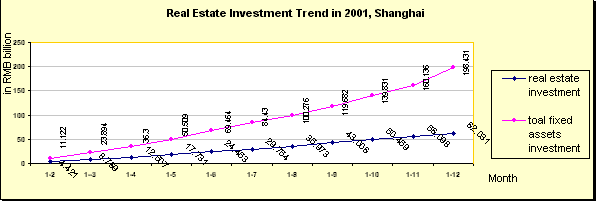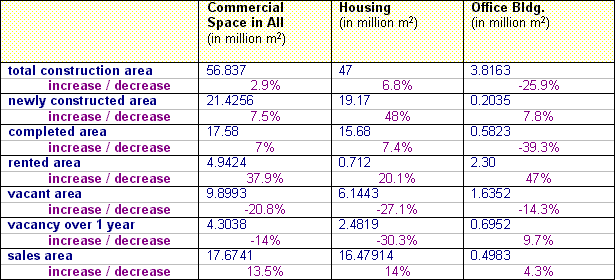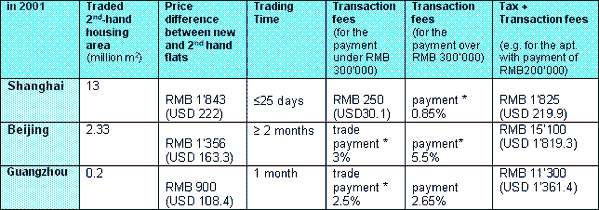
| ISSUE N° 3 April, 2002 |
|
Shanghai Housing Market China's real estate industry witnessed a fast growth in 2001, becoming one of the driving forces of the country's economy in the period. According to the National Bureau of Statistics, last year funding for real estate development increased by 25.3% over the previous year to RMB 624.6 billion (USD 75.25 billion). Zeng Peiyan, Minister of the State Development Planning Commission, claimed at a press conference early this year that unlike the bubbles seen in the real estate sector in early 1990s, the real estate development in the last two years has been healthy. Noticeably, housing industry has played a key role in stimulating the real estate development and domestic demand. It shall continue to show a great potential in the next few years, according to the national Five-Year planning. At the national meeting on housing reform held on Feb. 8, 2002
in Shanghai, officials from the Housing and Real Estate Department
under the Ministry of Construction urged that all the cities should
work out their monetary housing subsidy plans by the end of March
and carry out housing reforms based on the plans. Since the real
estate markets vary from city to city, some places are far delaying
their plans, but Shanghai is well ahead and is recognized as having
a comparatively mature housing market. Housing authorities from
the cities in the western area are all studying the experience
of Shanghai in order to work out their own local recipe. Before 1997, the local authority did not pay attention at all to integrate planning. After 1997 the situation started to change and planning got more and more attention. A series of policies were gradually published by 1999 in the hope to stimulate the housing market. The most impressive incentives included individual income tax refunds and monetary housing subsidies. Both policies set precedent in the country. With this reform, people began to cater for individual purchases on houses and apartments instead of getting them from work units. Besides, the city has also scrapped many transaction fees and eased the formalities. As a result, not only the first level market but also the second-hand housing market have been activated. Even more foreigners and Chinese from outside Shanghai have been attracted to purchase houses and apartments in Shanghai. The following charts can demonstrate the achievements and features
of Shanghai's housing industry in 2001. ("Shanghai Statistics"
published by Shanghai Statistics Bureau)
Most of the investment was absorbed by housing construction, as shown in the following chart. Breakdown of Shanghai Real Estate Investment in 2001
Much different from Beijing where housing prices are highest in China, 96.7% of the sold housing area in Shanghai have been bought by individuals rather than enterprises. This phenomenon can be attributed to the following aspects:
The following chart comparing the second-hand housing market
in Beijing, Shanghai and Guangzhou may display the openness and
easiness of the housing market in Shanghai from another angle.
The current quality of houses and apartments in general are not
very satisfactory as contractors use material with low technology.
In consideration of the mandatory schemes stipulated by the Shanghai
Housing Municipal Administration Bureau, it is getting more urgent
to introduce new material and technology that is energy-saving
and environmentally friendly. By 2005, all housing developers
must fulfill the following requirements: In detail, the city hopes to introduce more foreign supply and co-operation in the following fields: 1. wall material Clay brick is officially banned in use throughout the country. Currently porous bricks are mainly used in construction yet will be banned as well someday. Thus, air brick technology is called for. There is only one German joint venture in Shanghai manufacturing air bricks. Although having undergone difficulties since its establishment four years ago, the joint venture is picking up business thanks to the government direction on air bricks. 2. thermal insulating material for walls and windows The external walls of many buildings are covered with steel reinforced concrete and concrete mixture, thus have little capability to preserve warmth and insulate heat. While the city consumes around 50 million tons of coal annually, buildings dissipate about 12 million tons of coal, nearly one forth of the total. Thermal insulation material that can be applied to external walls is preferred, since internal application will lessen the usable floor area. The ideal wall complex shall consist of air bricks and tiers of water-proof and thermal insulation material.
3. decoration material Traditionally the housing that people buy is only semi-finished,
hence homebuyers have to hire a contractor to finish interior
decoration. It is not only a tiresome investment of time and money.
Sometimes it can be an incredible headache, for most homebuyers
lack knowledge and power to judge the quality of both the The Shanghai Housing Municipal Administration Bureau controls the quality of mandatory decoration work by publishing a "Catalogue of Government-Recommended Decoration Material". To put it in a nutshell, building material manufacturers must first apply with the Bureau. Then the Bureau, together with the Housing Industry Development Association, will organize a team of experts to appraise the quality of applied products in accordance with certain criteria. If the products are up to the standards, they will be insured by insurance companies and promoted by the government to homebuyers via housing developers. Homebuyers can set the decoration style by selecting the specific decoration material from a list. According to Mrs. Li, the government welcomes more foreign building material suppliers with really advanced products to apply for being listed in the catalogue. At present, homebuyers do not have enough options. For example, there are only two suppliers of so-called "green paint", and just one supplier of kitchen sets (Haier, famous brand from Qingdao, Shandong province) recommended in the catalogue. 4. heating and cooling system In many buildings, air conditioners are approaching the end of depreciable life and should be replaced. New types of AC systems with environmental protection technology will find favor in the market. 5. utilization of solar-energy and geothermal energy resources The problem frowned upon by the government is how to accommodate the utilization of solar and geothermal systems with the specific features and demand of housing construction in Shanghai. Some Canadian architecture institutes tried but failed to work out a cost-efficient proposal. 6. re-use of household discharged water Shanghai is a city lacking water and land resources. Recycling of used water is a way to economize on water. There are various ways to treat used water discharged from household, such as physical, biochemical and biological processing. In one residence, "Olympic Garden", such a recycle system has been applied but only for use in centralized irrigation and cleaning. Occupying too large a space, such systems are not suitable to a city like Shanghai with her lack of land area. What is needed is a small household appliance that individual households can reclaim the water and reuse it to clean the car, irrigate the garden and flush the toilet etc. 7. elevators Shanghai is becoming an aging society as 2.466 million people are already over the age of 65, while in 2000 the figure was 1.93 million, accounting for 11.53% of the city's total population. Most of the senior citizens are living in old buildings with 5 to 7 stories. Therefore, elevators that are not expensive and can be added outside the buildings will be demanded in the renovation projects implemented by the government. 8. relevant Insurance Service In addition to importing new building material, the authority
also intends to involve foreign insurance companies to insure
building materials and housing performance following government
certification. As mentioned above, insurance is involved in governmental
recommendation of decoration material to homebuyers of decorated
housing. However, no insurer so far has launched the service for
commercial housing. 1. Responsible authority and organization - Shanghai Housing Municipal Administration Bureau - Shanghai Housing Industry Development Association
2. Relevant exhibitions to be held in Shanghai this year
15.5.2002 Consulate
General of Switzerland |
Back to the top of the page
Page created and hosted by SinOptic



